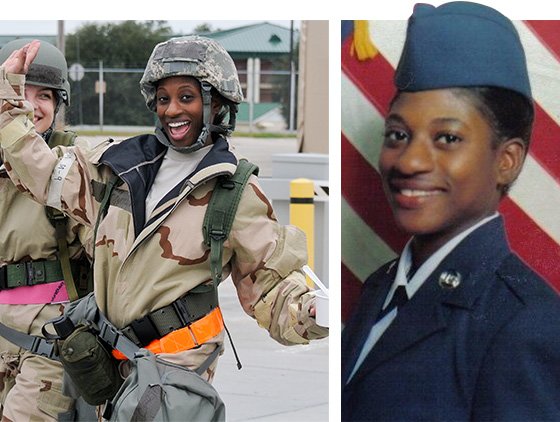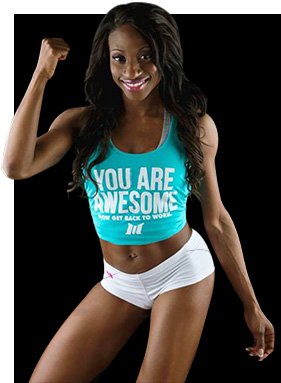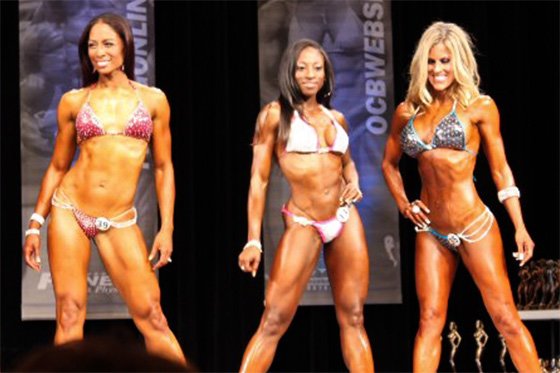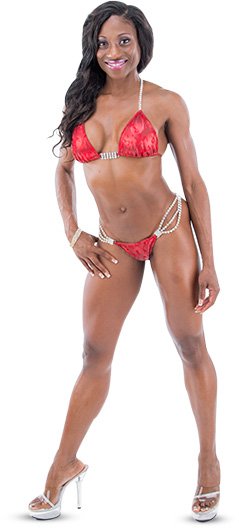You can't have just one skill in the Air Force. You must adapt and grow to meet changing ever-changing demands both in the sky and on the ground.
As Celena Carter knows very well, this applies to the weight room as well. To build an all-around physique, she couldn't rely on one program for her entire career. She had to get stronger, better, and more athletic in order to keep progressing toward her goal physique.
Celena is close, but she's not quite done yet. She is a natural competitor who hopes to kick down the doors of the NPC and stand atop those amateur stages. And of course, that goal has a bigger goal blue-sky goal looming above it: becoming an IFBB Pro Bikini competitor. As her skills diversify and her career takes shape, she is showing she has what it takes to get there.
How did you get started in bodybuilding?
I'm a model and desired more fitness-type modeling work. One day, while browsing through the fitness magazines, I noticed that a lot of the women in these magazines were also competitors. I was envious of how great their bodies looked and felt inspired to want to try competing. That's when I contacted a trainer name Alli Kerr out of Macon, Georgia. Alli is a WNBF Figure Pro and is the owner of an all-ladies fitness center called the Pink Physique. Alli took me on as a client and the rest is history.
What inspired you to join the military?
My mother was my greatest inspiration growing up. She worked two jobs to make ends meet, kept a roof over our heads, and put clothes on our backs. She raised three kids, and she wanted me to have a big future and not have to struggle the way she did on her own. Joining the military looked promising for me to learn new skills while gaining knowledge, professionalism, and integrity— but to also earn money for college. College was definitely an underlying factor for joining the military. However, now that I've experienced both civilian workforce and military, and I would choose the military or federal civil service any day.

What is the hardest part of making the transition from civilian life to military life?
The hardest part was the unknown. The recruiter can try to prepare you and tell you things that he or she thinks you want to hear, but nothing can prepare you for military training like the actual training. After all the initial jitters go away, everything becomes a piece of cake when you follow directions.
Describe your duties in the military.
I wear a multitude of hats in my unit. I work in the Logistics Management career field as a functional supply systems analyst. I'm also an information assurance Officer, ADPE equipment custodian, and our unit's primary security manager.
How important is technology in the modern military?
Modern technology is extremely important in the military to be able to keep up with job knowledge, processes, and procedures. In addition, we need modern technology to counter any cyber-attack from enemies and spies, which occurs almost every day. Furthermore, military technology needs to not only mirror the civilian workforce technology but we also should have advanced technology for intelligence purposes.

How did your tours of duty change the way you look at fitness?
Tours of duty never changed the way I look at fitness. I've always looked at staying fit as a must, regardless of being in the military or not.
If you hadn't gone into the military, what occupation would you have pursued?
I probably would have been in the criminal justice career field working for the court system. That is what my undergrad degree is in.
Has your M.O.S. positioned you for a career after the military?
I do believe that my AFSC has prepared me for great skills after the military. However, I don't want to limit myself to just one career field, which is why I'm furthering my education with an advanced degree.
How does fitness differ in the different military branches?
All I know about the differences is that other branches are very jealous of us Air Force members! Actually, active duty members are deployed along with a lot of the army members and have to go through the same combat skills training before they are sent to Afghanistan and other similar deployed bases. Due to the up-tempo of deployments, the fitness criteria for Air Force members have changed drastically.
What is the biggest obstacle in leading a military lifestyle?
The biggest obstacle is being able to balance military life with home and fitness competitions. A lot of times I'm close to a show but have to work long and odd shifts. Also, I have to worry about being there for loved ones when they need me.
What is your favorite part about weightlifting?
I love leg day. Mondays are my "International Leg Days." I love to be challenged and try new workouts to get my metabolism revved up. Least favorite? Chest. It's not necessary for a bikini competitor like myself. Push-ups will suffice. Enough said.

Do you think it's more/less difficult for military personnel to stay in shape, as opposed to civilians?
It shouldn't be more difficult in my opinion. Military members are expected to stay in shape to be fit to fight. We are considered among the elite of the workforce and are held to higher standards.
How does fitness affect your role in the armed services?
More and more, fitness has become a staple and an important role in your career if you want to continue to make the higher ranks. You cannot lead by example if you constantly fail PT tests. Maintaining personal fitness is everyone's responsibility. I also like to look at it as part of my job.
What is your athletic background like? Have any sports impacted your fitness?
I never played any sports in high school. However, my mother is a fitness freak and later turned to personal training. So I've always had the fitness influence instilled in me from when I was a little girl.
You said you got into fitness late. Now that you've found it, do you regret not getting fit earlier?
I started bodybuilding late. However, I've been into fitness since I was a little girl thanks to my mother. I do regret that I hadn't found competitive sports earlier. I enjoy the thrill, drive, camaraderie, and the sense of elite among all competitors. I love this life!
What are your future bodybuilding plans?
I am currently a natural IFPA Bikini Pro. The IFPA is the same organization that gave world-renowned nutritional scientist Dr. Layne Norton his bodybuilding pro card. I've also competed in the natural PNBA in the PNBA Pro Bikini Divas division and won. So I now have two natural pro cards: IFPA and PNBA Pro. Although I love being associated with these natural organizations, I have tried my hand in the NPC organization and was also successful. I have competed in two regional shows for both open bikini and master's divisions and became nationally qualified in both. Therefore, my ultimate goal is to become an IFBB Bikini Pro.

What would it mean to you to earn your IFBB pro card?
It meant the world to me when I earned my IFPA Pro card! I earned it in 2012 after doing only three shows. But I know all the hard work and maximum sacrifice I put into it. I love a challenge, which is why I want to go for my IFBB Pro status as well.
What have you learned from your NPC competitions?
NPC is on a different level of playing field. You will have your popular competitors that may get the nod over someone else. Or you may compete against someone who is not necessarily a "natural" athlete. So it is a lot tougher, but I welcome the challenge. I know that in the NPC, I will have to train harder than I have before and my diet will pretty much stay the same. I just have to make sure I stick to the plan!
Who are your favorite bodybuilders?
My favorite bikini competitors are IFBB Pro Amanda Latona and IFBB Pro Nathalia Melo. I love Amanda Latona's stage presence and I love Nathalia Melo's killer athletic bikini body!
What one tip would you give other bodybuilders in the military?
As military members, we have a duty to serve our country. We must continue to set an example in all aspects of our lives whether it's through bodybuilding, work, or home life. If your desire is to compete, go to a show first, get a trusted trainer who will get you on the right path, and give it all you've got!
I wouldn't suggest jumping feet first into preparing for a show that you know you wouldn't have time to truly dedicate the preparation time. Don't think you will be show ready two weeks after returning from a six month deployment! Your body and mind have to get acclimated to current situations in the United States, weather, stress, and your home life.
